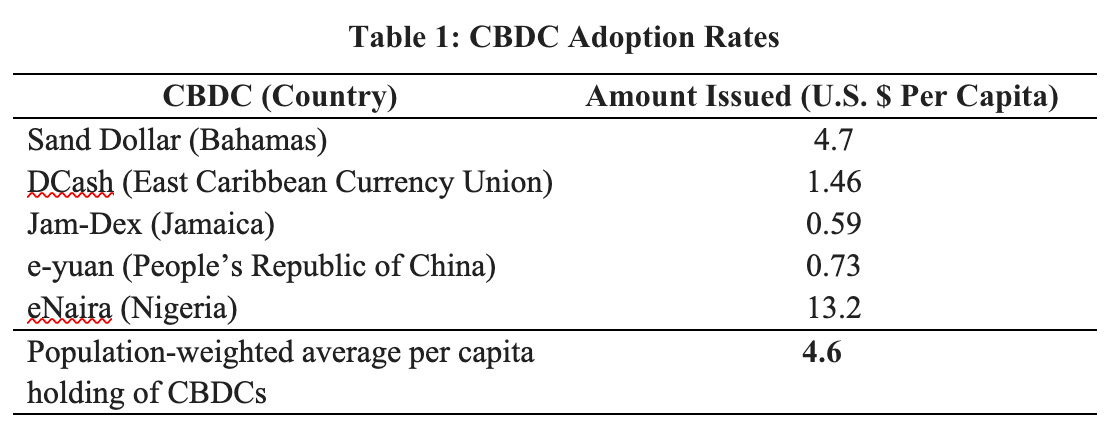Wherever Central Bank Digital Currencies (CBDCs) have been attempted, adoption rates by the public have been extremely low. Two CBDCs – the Avant smart card system in Finland, and the dinero electrónico in Ecuador – have already been launched and failed, as I show in my recent paper “So far, Central Bank Digital Currencies have failed”, published in Economic Affairs.
To examine the popularity of CBDCs among the public in countries that have introduced them – the Bahamas, the East Caribbean Currency Union, Jamaica, the People’s Republic of China and Nigeria – and where they are still in circulation, one can examine CBDC adoption rates expressed in terms of average U.S. dollar amounts of CBDC held per capita. These adoption rates are shown in the following Table:
Table 1: CBDC Adoption Rate:
 Notes: Adoption rates are taken to equal CBDC in circulation divided by the national population, except for China where it is assumed that the rollout has now reached 261 million people. Data for CBDC adoption rates are taken from the CBDC data provided by the central banks that have issued them
Notes: Adoption rates are taken to equal CBDC in circulation divided by the national population, except for China where it is assumed that the rollout has now reached 261 million people. Data for CBDC adoption rates are taken from the CBDC data provided by the central banks that have issued them
CBDC adoption rates have been very low in Nigeria, and lower still everywhere else. The amounts of CBDC adopted vary from an average holding of $13.2 per capita for the eNaira in Nigeria down to an average holding of $0.59 per capita for the Jam-Dex in Jamaica. The population-weighted average per capita CBDC holding across all countries is a mere $4.6, barely enough to buy a few items from your local dollar store.
To give another perspective, Table 2 shows CBDC issues as a percentage of total central bank liabilities, and a not too dissimilar picture emerges: CBDC issues are very low for all countries, and especially China.
Table 2: CBDC Issues as a Percentage of Total Central Bank Liabilities The clear implication is that the public do not want CBDCs.
The clear implication is that the public do not want CBDCs.
Perhaps central banks should pay attention to what the public want – or, in this case, don’t want.











